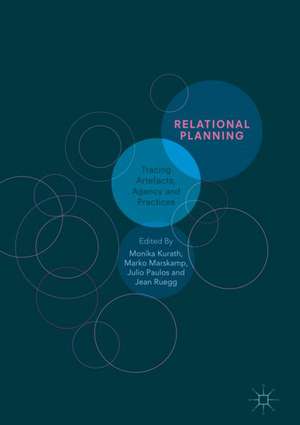Relational Planning: Tracing Artefacts, Agency and Practices
Editat de Monika Kurath, Marko Marskamp, Julio Paulos, Jean Rueggen Limba Engleză Hardback – 28 sep 2017
This volume introduces the notion of ‘relational planning’ through a collection of theoretical and empirical contributions that explore the making of heterogeneous associations in the planning practice. The analytical concept builds on recent approaches to complexity and materiality in planning theory by drawing on Science and Technology Studies (STS) of urban issues. It frames planning as a socio-material practice taking place within the multifaceted relations between artefacts, agency and practices. By way of this triad, spatial planning is not studied as a given, linear or technical process but rather problematized as a hybrid, distributed and situational practice. The inquiries in this collection thus describe how planning practices are negotiated and enacted in and beyond formal arenas and procedures of planning, and so make visible the many sites, actors and means of spatial planning.
Addressing planning topics such as ecology, preservation, participation, rebuilding and zoning, this volume takes into account the uncertain world planning is embedded in. The implications of such a perspective are considered in light of how planning is performed and how it contributes to the emergence of specific socio-material forms and interactions. This is an invaluable read for all scholars of STS, Ecology, Architecture and Urban Planning.
| Toate formatele și edițiile | Preț | Express |
|---|---|---|
| Paperback (1) | 529.42 lei 38-44 zile | |
| Springer International Publishing – 18 aug 2018 | 529.42 lei 38-44 zile | |
| Hardback (1) | 786.52 lei 43-57 zile | |
| Springer International Publishing – 28 sep 2017 | 786.52 lei 43-57 zile |
Preț: 786.52 lei
Preț vechi: 959.18 lei
-18% Nou
Puncte Express: 1180
Preț estimativ în valută:
150.50€ • 157.56$ • 124.53£
150.50€ • 157.56$ • 124.53£
Carte tipărită la comandă
Livrare economică 07-21 aprilie
Preluare comenzi: 021 569.72.76
Specificații
ISBN-13: 9783319604619
ISBN-10: 3319604619
Pagini: 314
Ilustrații: XI, 337 p. 18 illus., 16 illus. in color.
Dimensiuni: 148 x 210 mm
Greutate: 0.57 kg
Ediția:1st ed. 2018
Editura: Springer International Publishing
Colecția Palgrave Macmillan
Locul publicării:Cham, Switzerland
ISBN-10: 3319604619
Pagini: 314
Ilustrații: XI, 337 p. 18 illus., 16 illus. in color.
Dimensiuni: 148 x 210 mm
Greutate: 0.57 kg
Ediția:1st ed. 2018
Editura: Springer International Publishing
Colecția Palgrave Macmillan
Locul publicării:Cham, Switzerland
Cuprins
Introduction: Rethinking Planning Through the Lens of STS.- Part I - Identifying Planning Artefacts.- 1. Analysing Urban Governance at a Distance.- 2. Artefacts, the Gaze and Sensory Experience.- 3. Politics of Zoning.- Part II - Distributing Planning Agency.- 4. Can the Craft of Planning be Ecologized?.- 5. Constructing the Urban Citizen.- 6. Tracing the Democratic Deficit.- 7. Masterplans as Cosmograms.- Part III - Assembling Planning Practices.- 8. Re-assembling a City.- 9. Planning Ecologies.- 10. Saving Schools.- Afterword: Planning and the Non-Modern City.
Notă biografică
Monika Kurath is a senior researcher and group leader at the Center for Research on Architecture, Society and the Built Environment (CASE) at ETH Zurich, Switzerland.
Marko Marskamp is a PhD researcher and research assistant at the University of Lausanne and the ETH Zurich, Switzerland.
Julio Paulos is a PhD Candidate at the ETH CASE Centre on Society, Architecture and the Built Environment in Zurich, Switzerland. He is an assistant researcher on the project 'Rethinking Zones: A comparative study of planning cultures'.
Jean Ruegg is a professor of Human Geography at the University of Lausanne, Faculty of Geosciences and the Environment, Institute of Geography and Sustainability, Switzerland.
Textul de pe ultima copertă
This volume introduces the notion of ‘relational planning’ through a collection of theoretical and empirical contributions that explore the making of heterogeneous associations in the planning practice. The analytical concept builds on recent approaches to complexity and materiality in planning theory by drawing on Science and Technology Studies (STS) of urban issues. It frames planning as a socio-material practice taking place within the multifaceted relations between artefacts, agency and practices. By way of this triad, spatial planning is not studied as a given, linear or technical process but rather problematized as a hybrid, distributed and situational practice. The inquiries in this collection thus describe how planning practices are negotiated and enacted in and beyond formal arenas and procedures of planning, and so make visible the many sites, actors and means of spatial planning.
Addressing planning topics such as ecology, preservation, participation, rebuilding and zoning, this volume takes into account the uncertain world planning is embedded in. The implications of such a perspective are considered in light of how planning is performed and how it contributes to the emergence of specific socio-material forms and interactions. This is an invaluable read for all scholars of STS, Ecology, Architecture and Urban Planning.
Caracteristici
Offers a new model for research and teaching in urban studies, planning theory, and geography Provides interdisciplinary theoretical and empirical contributions exploring the making of hybrid associations in planning practice Examines the real world problems encountered in planning procedure
